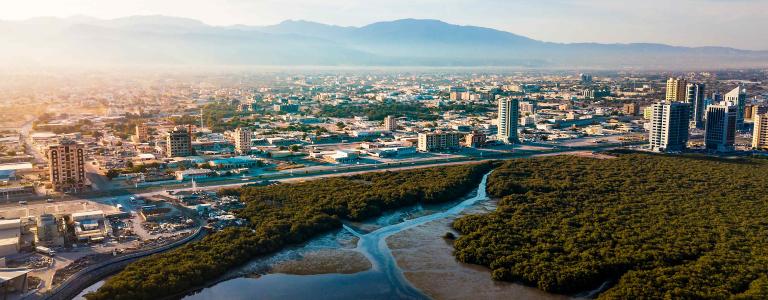Nature-Based Infrastructure 5-Week Program
The Nature-Based Infrastructure Global Resource Centre's 5-Week Live Program is back this autumn, helping investors, policymakers, infrastructure planners, and other stakeholders to make the case for building with nature.
The Nature-Based Infrastructure Global Resource Centre's 5-week live program aims to empower policy-makers, infrastructure planners, investors and other stakeholders by providing them with the tools to evaluate and analyze the economic performance and co-benefits of Nature-Based Infrastructure (NBI).
This course will explore a world of nature-based solutions which can contribute the same services as, or combine with, “built” or “grey” infrastructure, especially in communities most-effected by climate change. Every year, the program convenes professionals from all over the world. Last year, we registered over 650 stakeholders from 95 countries and received a 98% course satisfaction rate.
“This has been the best course in relation to NBI that I’ve done until now. The combination of remote classes and written material is very good, and the presenters have been excellent. It also covers a great range of things related to NBI.”
How does it work?
Taking place every Wednesday from 25 September to 23 October 2024, we will meet on Zoom for a 2-hour session at:
Washington DC, USA 09:00 EDT
Geneva, Switzerland 15:00 CEST
New Delhi, India 18:30 IST
The program combines online reading materials with interactive Zoom sessions, allowing you to ask our experts questions, exchange experiences with other participants from around the world, hear from guest speakers, and dive deeper into the course topics in real-time exercises. Remember to sign up for Zoom at the link when you create your account!
The training is free of charge, and you will be awarded with a named certificate after the course is complete. You can attend selected sessions only, but it is strongly recommend you participate in the entire program.
What does it cover?
In this course, you will learn how NBI contributes to climate adaptation and sustainable development. You will be able to make a compelling case for NBI by explaining its economic, environmental, and social benefits, as well as compare this to conventional grey infrastructure.
The course will explain how to use a variety of different methods to value NBI, as well as present real-life NBI case studies from around the world. With this knowledge, we hope that policy-makers, infrastructure planners, and investors will be better equipped to make informed decisions about infrastructure investments and utilize NBI for climate adaptation and mitigation.
Course Schedule
25 SEPTEMBER: 1. NATURE-BASED INFRASTRUCTURE AND CLIMATE ADAPTATION
In this first session, we introduce you to NBI and its value for meeting infrastructure needs in adapting to climate change. We will look at the potential of NBI for various environments: Cities, Forests, Rivers, Coasts and Wetlands, as well as guidelines for planning NBI.
2 OCTOBER: 2. SYSTEMS THINKING FOR INFRASTRUCTURE DECISION-MAKING
In our second session, we look at the benefits of using integrated valuations for infrastructure decision-making, as well as solutions for overcoming the barriers for sustainable infrastructure. We will introduce you to our Sustainable Asset Valuation (SAVi) methodology and the use of systems thinking and system mapping to understand the wider impacts of an NBI project for the environment, society and the economy. Through examples, we will highlight how you can use this approach to plan and value your own NBI projects.
9 OCTOBER: 3. INTEGRATED COST-BENEFIT ANALYSES USING EXCEL-BASED MODELS
In this third session of the live program, we will dive into using excel-based modelling to quantify the indicators of an NBI project, as well as take you through the steps of creating an integrated Cost-Benefit Analysis. From integration of qualitative knowledge to data collection and scenario analysis, you will grasp the step-by-step modelling process allowing you to make the business case for NBI projects.
16 OCTOBER: 4. CLIMATE DATA AND SPATIAL ANALYSIS FOR NBI
In our fourth session, we will explore how climate data can be used to evaluate the impacts of NBI under various scenarios, modelling projects in a way that takes the effects of climate change into account and reduces the guesswork of a project’s long-term efficacy. We will also delve into the world of spatial modelling, a valuable tool in achieving the most effective NBI interventions for your specific geography, illustrated through case studies and demonstration.
23 OCTOBER: 5. FINANCING ANALYSIS AND SOLUTIONS FOR NBI
In this final session, we will dive into the crucial world of financing solutions for NBI, looking at a variety of methods, instruments and practices. Using our excel-based financing model, we will demonstrate how to approach this critical final step towards project implementation.
